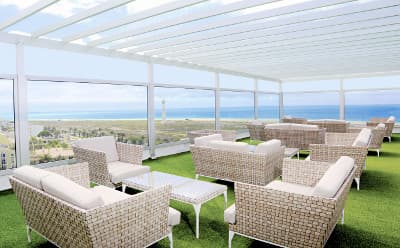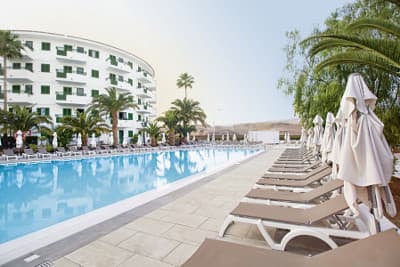Over the years, the FTI GROUP has embarked on a series of green initiatives to transform itself into a more eco-conscious firm. Through its MP Hotels company, the FTI GROUP is adding another ambitious project to its collection of sustainable goals.
Munich – MP Hotels, the hotel management arm of the Munich-based FTI GROUP, has announced a pilot food waste program that could be rolled out across several more of its properties at later period if deemed successful. This ambitious green initiative was first carried out in three of its hotels in the Spanish Canary Islands archipelago. Lemon & Soul Cactus Garden on Fuerteventura, LABRANDA Playa Bonita on Gran Canaria and LABRANDA Bahía Fañabe on Tenerife were the three hotels chosen for this exciting pilot program.
Lemon & Soul Cactus Garden
“Lowering our impact on the environment has become a part of our overall business strategy,” said Roula Jouny, CEO of MP Hotels and Chief Content Officer for the FTI GROUP.
“MP hotels strives to provide not just an excellent hotel experience, but also one that is carried out in a sustainable fashion.”
The hotel and leisure industry are in the midst of an ongoing green trend. Due to the high volume of services and visitors to hotels, waste is a natural effect in the causal relationship. Sustainable waste management techniques can be implemented to mitigate this reality. In the process, hotels can achieve a result that is not just better for the environment, but also for their bottom line.
“By tackling the food waste issue at our hotels we are also becoming more efficient as a commercial operation in the long-run,” said Jouny. “It is not only good stewardship from a communal standpoint, but also simply good for the health of our business.”
As part of FTI’s companywide project for sustainable practices, the group partnered with Futouris, a Berlin-based environmental non-profit, and United Against Waste e.V. (UAW), a food industry association with a focus on waste mitigation, to develop sustainable food handling measures at the three selected hotels. Food & Beverage employees from each of the chosen hotels were trained in sustainable food practices. Food waste was scaled & analyzed at each property during the first month and measures were developed accordingly. The food waste was measured in reference to storage, production, excess and plate return between the months of May and June. With the help of UAW’s online waste analysis tool, the quantities were methodically recorded and examined.
“It should be no surprise that at MP Hotels we like to work with concrete goals in mind,” said Jouny, whose hotel group has grown to a whopping 70 plus hotels in just 4 years. “We always set aggressive targets and hold ourselves accountable if we miss business related goals. With sustainability, we are applying this same discipline.”
Last August, the results were showcased by UAW in a workshop. During the latter, LABRANDA Bahía Fañabe showed the greatest potential for waste reduction in production waste and excess, while LABRANDA Playa Bonita proved to be particularly adept to overall waste reduction and plate leftovers.
LABRANDA Playa Bonita
Although “Zero Food Waste” has been the declared target for all of our hotels, this ultimate aim is to be achieved in a series of stages. For this first pilot stage, a saving of 30 percent has been selected as the short-term goal. Amongst the many ways that each hotel is striving to reach this goal is by coming up with ways that optimize food portions served. The latter will include the introduction of show cooking stations where portions can be adapted to the wishes of guests. In order to reduce the number of plate leftovers, smaller portions will also be used on the buffet. Communication between key departments, such as kitchen and service, is also being enhanced for the purpose of providing a more optimal amount of food during services. Waiters will now be monitoring the number of guests attending their restaurants during meal shifts to better forecast the quantity of food necessary to meet demand.
These sustainable strategies and others are going to be tested between September and October of this year. The amount of food waste will be monitored closely at each hotel every four weeks and adjusted accordingly to reach the desired 30 percent goal. Upon the completion of this pilot program, MP Hotels will analyze the data and determine its overall effectiveness. If deemed fruitful, these techniques will be implemented across other MP Hotels in the Canary Islands.
“We are excited to dig deeper into the data of this program,” said Jouny. “This could really be a game changer for our group.”
Visit us on MPHotels.com, connect with us on Facebook and Instagram.
For further Information, please contact: Asha Joshi | Social Media Associate, Meeting Point International & MP Hotels | asha.joshi@meetingpointint.com | Author of press release: Alejandro Lopez de Haro, Brand Development Manager, MP Hotels






